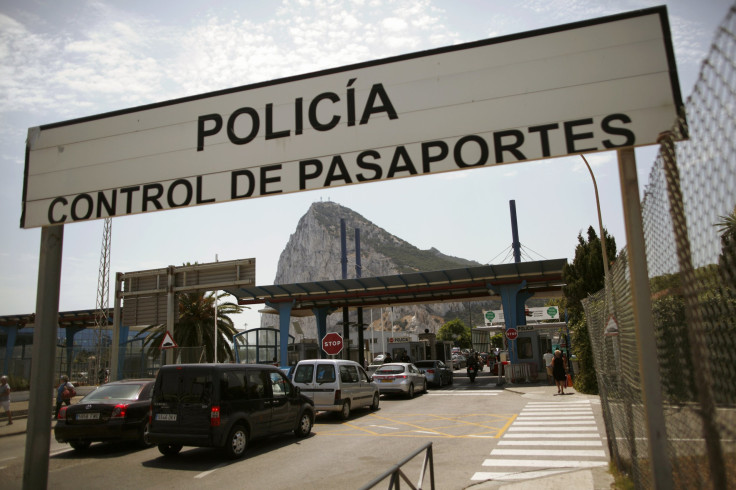What The Gibraltar Row Is About And How Border Fees Could Hurt Tourism

At less than six square kilometers (2.3 square miles) and with only 30,000 residents, the tiny self-governing British territory of Gibraltar isn’t much to fuss about. Yet “The Rock,” as it is known, has been for years a site of contention between Spain, with which it shares a border, and the UK, of which its residents are citizens.
A dispute over the territory that has spanned centuries flared up in late July after the Gibraltar government, without prior warning, dropped dozens of bulky concrete blocks into the bay to create an artificial reef. The government said it did so to encourage sea life to flourish in the area, but Spanish fishermen saw things differently.
Spain said the blocks have hurt the local fishing industry, and were dumped into the ocean “without necessary authorization” in what it claims to be Spanish waters. Indeed, European courts recognized Spain’s claim over the waters twice last year, and the nation has asked Gibraltar to remove each and every concrete block off the coast.
Fishing rights had been the largest manifestation of the conflict until the tit-for-tat war of words took a new twist at the solitary land border to enter Gibraltar from Spain, where increased customs and border controls have created delays of up to seven hours. These have largely eased in recent days, but the conflict is far from abating.
Gibraltar owes its British flag to the 1713 Treaty of Utrecht and a humiliating defeat in the War of Spanish Succession. The UK received “perpetual” control over the land thereafter, though in recent years Spain has claimed it as its own. In reality, the rocky outcrop just off the entrance to the Atlantic Ocean has been of little strategic significance since World War II, and is largely sustained by its banking and tourism industries these days.
Consequently, that’s exactly where Spain is hitting back at Britain, by impeding border crossings and threatening a hefty fee to enter the popular destination.
Spanish Foreign Minister Jose Manuel Garcia Margallo said in an interview with Spain’s ABC newspaper Sunday that the “party is over,” and that the government would no longer turn a blind eye to the “irregularities” in Gibraltar. Garcia said he was considering several new steps, including a 50-euro ($66) entry and exit fee, airspace restrictions and even fiscal oversight of the offshore territory. His words quickly added fuel to the flames.
“We are concerned by the comments on Gibraltar, which we are looking into further,” the British Foreign Office noted Monday. “As we have said, we will not compromise on our sovereignty over Gibraltar, nor our commitment to its people.”
A legacy of British imperialism it may be, but Brits argue that it’s hypocritical for Spaniards to cry fowl when they own two similar slivers of land along the Morocco coast on the Strait of Gibraltar: Ceuta and Melilla. Both are vestiges of Spain’s colonial past in Africa, and both are parcels that are disputed by Morocco.
Britain further argues that any border bottlenecks will hurt the 10,000 Spanish workers that must cross over into Gibraltar each day far more than the concrete blocks have hurt the fishermen. Many of these Spaniards work in the lucrative offshore banking industry or for Gibraltar’s thriving tourism and hospitality operations.
Gibraltar draws many visitors from cruise ships or for seaside vacations, but is also a popular day trip for tourists at nearby Spanish resorts thanks to its status as a tax-free haven for shopping. Numerous high-end British chains have branches or franchises in Gibraltar, including Marks & Spencer and Mothercare, while international retailers like Tommy Hilfiger, Mango and Sunglass Hut have a strong presence, too. Other attractions on the limestone outcrop include the luxurious port, caves, underground tunnels, a Moorish castle and a cheeky colony of Barbary macaques.
The Gibraltar Tourist Board told trade magazine Travel Daily that it was confident any move to introduce new fees for the more than 30,000 visitors who cross over each day would be unlawful. “The Gibraltar Tourist Board is always concerned with any external factors that may affect tourism to the Rock in a negative way. Like all in Gibraltar, this situation will be monitored with interest, but we are confident that any attempt to introduce a border fee would be illegal.”
Gibraltar receives 11.3 million people across its border annually, according to government figures, giving it more than 400 visitors for every citizen. The Guardian newspaper estimates that if the Spanish government imposed a 50-euro levy at the border, Spain could earn 565 million euros each year -- assuming the fee hike doesn’t scare visitors away.
© Copyright IBTimes 2024. All rights reserved.






















